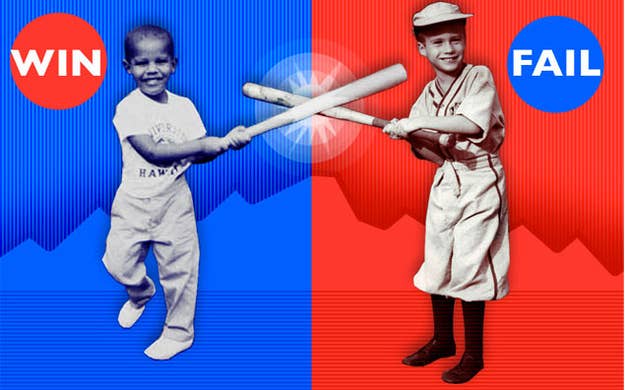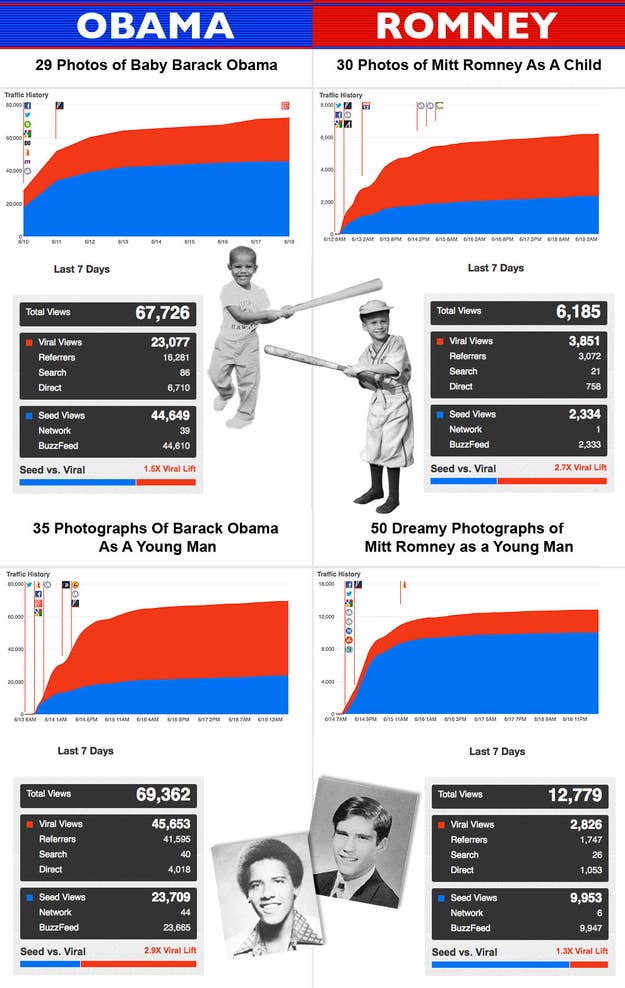
In the war of partisan trash talk that frequently consumes online political media, one truth has emerged from this year's election coverage that transcends ideology: No one wants to read about Mitt Romney.
The well-starched Republican's traffic poison has been felt this year at websites across the political spectrum — including at BuzzFeed — and it's left many editors, publishers, and bloggers yearning for the days of the unpredictable Sarah Palin, the maverick John McCain, and the Obama-Clinton blood feud. Bloggers and editors are left to decipher its causes — is it Romney's discipline, his blameless personal life, or the simple fact that his supporters are less likely to be trolling the web?
"Some of this is probably because Romney is old news; in a sense he's been running for president for five years," said Matt Lewis, a blogger at conservative news site The Daily Caller. Lewis, like other journalists interviewed, declined to share specific metrics. But he said he sees a noticeable drop-off in online engagement when he writes a post about Romney.
"He's also a middle-aged white guy, which is boring because it is so common in our history," he said.
And while he said he misses the days "when merely mentioning the name Sarah Palin would give you an automatic spike in both traffic and buzz," Lewis said Romney's traffic-killing persona could be good for him, politically.
"I do think there is often an inverse relationship between running a serious and disciplined campaign, and generating a huge amount of online excitement," he said. "Being exciting and being serious aren't mutually exclusive, but only the truly great politicians seem to maximize both."
Garance Franke-Ruta, senior politics editor at TheAtlantic.com, attributed Romney's deadening effect on traffic to his consistent refusal to veer off his campaign's blame-Obama script.
"Romney is a very cautious politician who benefits from operating under the radar and having the focus of the contest be on Obama," she said. "It's Mittness Protection, general election style. The more boring he is, the more attention — which in today's media means negative attention — focuses on Obama."
Another specific damper on traffic: The Drudge Report, the largest single source of traffic to the political web, rarely links stories critical of the Republican nominee.
But as BuzzFeed's own statistics indicate, the phenomenon extends beyond traffic for day-to-day campaign stories. In a sort of controlled experiment, BuzzFeed's Andrew Kaczynski created two sets of similar, photo-heavy posts focused on the early lives of President Obama and Mitt Romney. One set focused on Obama's and Romney's childhoods, the other on Obama and Romney as young men. They were comparably promoted — with all four posts featured on the site's front page, and pushed out into the social media sphere — but in both cases the Obama-centric posts vastly outperformed those about Romney, as the chart below shows.

The greater interest in Obama's baby photos and adolescence when compared to Romney's could be a reflection of the outsize role the president's mythical personal narrative has played in his political ascent.
Since the publication of his 1995 memoir Dreams From My Father, Obama has positioned himself as a modern, if controversial, embodiment of the American Dream — a poor black child with Muslim heritage who rose from unlikely circumstances to become the leader of the free world. Liberals heralded the story as inspiring; conservatives used it to claim radicalism. And even now, as elements of his story have come under suspicion of embellishment, there remains huge public interest in the making of Obama — baby pictures included. That's apparently not the case for Romney's well-heeled, squeaky clean upbringing.
Not everyone was willing to draw larger assumptions out of the traffic failure of Romney-centric stories.
"We've noticed it, too, and it's tempting to over-interpret what it means," said Callie Schweitzer, deputy publisher of the left-leaning politics site Talking Points Memo. "We're still focused on bringing the substantive differences between the candidates and their campaigns to our readers."
And some editors said they didn't think Romney stories are necessarily less buzzy.
Jim VandeHei, the executive editor and co-founder of POLITICO, said they haven't compared traffic for Romney- and Obama-focused stories, but added, "anecdotally speaking, we do not detect an appreciable difference. The stories that pop online and go viral are the ones that break news or offer unique context to the campaign's dynamics." Similarly, Hot Air co-founder Ed Morrissey said "traffic and comments tend to be more topic-driven than personality-driven."
But at many other sites, the relatively small readership interested in Romney is painfully apparent, and has left editors reminiscing about the 2008 race. Franke-Ruta said, from a purely demographic standpoint, that election pulled in readers who had tuned out politics in the past.
For example, she said, "We know women are more likely to read about female politicians, so to the extent that the cast of characters in 2008 was more demographically diverse, there were more potential readers for the stories."
In the absence of the potential for a First Woman President or a First Black President, is there any saving grace that could salvage the next four months for politics websites?
"This is perhaps one of the reasons we should all be rooting for Romney to pick someone like Marco Rubio for veep," said Lewis.
